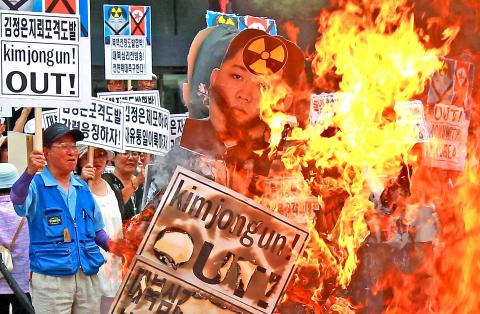North Korean leader Kim Jong-un yesterday declared his frontline troops are in a “quasi-state of war” and ordered them to prepare for battle a day after the most serious confrontation between the rivals in years.
South Korea’s military on Thursday fired dozens of artillery rounds across the border in response to what Seoul said were North Korean artillery strikes meant to back up a threat to attack loudspeakers broadcasting anti-Pyongyang propaganda.
North Korea’s declaration yesterday is similar to its other warlike rhetoric in recent years, including repeated threats to reduce Seoul to a “sea of fire,” and the huge numbers of soldiers and military equipment already stationed along the border mean the area is always essentially in a “quasi-state of war.”

Photo: EPA
Still, North Korea’s apparent willingness to test Seoul with military strikes and its recent warning of further action has raised concern because South Korea has vowed to hit back with overwhelming strength should North Korea attack again.
Pyongyang said it did not fire anything at South Korea, a claim Seoul dismissed as nonsense.
Kim ordered his troops to “enter a wartime state” and be fully ready for any military operations starting yesterday evening, according to a report by Pyongyang’s official Korean Central News Agency. North Korea has also given Seoul a deadline of today to remove border loudspeakers that, after a lull of 11 years, have started broadcasting anti-Pyongyang propaganda.
Failure would result in military action, Pyongyang said, but Seoul has vowed to continue the broadcasts.
A North Korean media report said that “military commanders were urgently dispatched for operations to attack South Korean psychological warfare facilities if the South does not stop operating them.”
South Korea’s Yonhap news agency, citing an unidentified government source, yesterday reported that South Korean and US surveillance assets detected the movement of vehicles carrying short-range Scud and medium-range Rodong missiles in a possible preparation for launches. The South Korean Ministry of National Defense said it could not confirm the report.
North Korea said South Korean shells fired on Thursday landed near four military posts, but caused no injuries. No one was reported injured in South Korea, either, although hundreds were evacuated from frontline towns.
The loudspeaker broadcasts began after South Korea accused North Korea of planting land mines that maimed two South Korean soldiers earlier this month, which Pyongyang denies.
North Korea on Thursday afternoon first fired a single round believed to be from an anti-aircraft gun, which landed near a South Korean border town, Seoul said. About 20 minutes later, three North Korean artillery shells fell on the southern side of the Demilitarized Zone dividing the two nations. South Korea responded with dozens of 155mm artillery rounds, according to South Korean defense officials.
South Korea’s military yesterday said that North Korea must refrain from engaging in “rash acts” or face strong punishment, according to South Korea’s Defense Ministry. South Korea raised its military readiness to its highest level. South Korean Joint Chiefs of Staff spokesman Jeon Ha-kyu told a televised news conference that South Korea is ready to repel any additional provocation.

The CIA has a message for Chinese government officials worried about their place in Chinese President Xi Jinping’s (習近平) government: Come work with us. The agency released two Mandarin-language videos on social media on Thursday inviting disgruntled officials to contact the CIA. The recruitment videos posted on YouTube and X racked up more than 5 million views combined in their first day. The outreach comes as CIA Director John Ratcliffe has vowed to boost the agency’s use of intelligence from human sources and its focus on China, which has recently targeted US officials with its own espionage operations. The videos are “aimed at

STEADFAST FRIEND: The bills encourage increased Taiwan-US engagement and address China’s distortion of UN Resolution 2758 to isolate Taiwan internationally The Presidential Office yesterday thanked the US House of Representatives for unanimously passing two Taiwan-related bills highlighting its solid support for Taiwan’s democracy and global participation, and for deepening bilateral relations. One of the bills, the Taiwan Assurance Implementation Act, requires the US Department of State to periodically review its guidelines for engagement with Taiwan, and report to the US Congress on the guidelines and plans to lift self-imposed limitations on US-Taiwan engagement. The other bill is the Taiwan International Solidarity Act, which clarifies that UN Resolution 2758 does not address the issue of the representation of Taiwan or its people in

US Indo-Pacific Commander Admiral Samuel Paparo on Friday expressed concern over the rate at which China is diversifying its military exercises, the Financial Times (FT) reported on Saturday. “The rates of change on the depth and breadth of their exercises is the one non-linear effect that I’ve seen in the last year that wakes me up at night or keeps me up at night,” Paparo was quoted by FT as saying while attending the annual Sedona Forum at the McCain Institute in Arizona. Paparo also expressed concern over the speed with which China was expanding its military. While the US

SHIFT: Taiwan’s better-than-expected first-quarter GDP and signs of weakness in the US have driven global capital back to emerging markets, the central bank head said The central bank yesterday blamed market speculation for the steep rise in the local currency, and urged exporters and financial institutions to stay calm and stop panic sell-offs to avoid hurting their own profitability. The nation’s top monetary policymaker said that it would step in, if necessary, to maintain order and stability in the foreign exchange market. The remarks came as the NT dollar yesterday closed up NT$0.919 to NT$30.145 against the US dollar in Taipei trading, after rising as high as NT$29.59 in intraday trading. The local currency has surged 5.85 percent against the greenback over the past two sessions, central